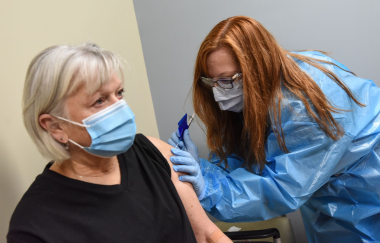The COVID-19 pandemic has disrupted the lives of people all around the world. The virus has led to school and business closures, travel restrictions, and a whole new normal as people practice social distancing.
One population that has felt these difficulties most acutely is our senior population. The COVID-19 pandemic poses specific challenges for this demographic, isolating older individuals who rely on regular medical care.
“In general, folks in senior facilities are being isolated more than the general public due to health concerns,” says Deanna Mangieri, DO, Specialty Medical Director of Geriatrics at Atrium Health. This has made it nearly impossible for loved ones to visit family members who might be in an assisted living facility or nursing facility.
Dr. Mangieri has seen firsthand how this isolation leads to anxiety for seniors and caregivers alike. That’s why it’s more important than ever for Atrium Health and caregivers to get creative as they work to support the seniors they love.
New challenges emerge for seniors
Whether it’s a parent, grandparent, neighbor, or friend, almost all of us know an elder who relies on help from caregivers. But as we practice social distancing, many seniors are feeling more isolated than ever.
Naturally, a major concern during this time is mental health. “We forget that a large portion of our senior population isn’t as well versed with use of virtual technology like Zoom and Facetime” explains Dr. Mangieri. “Staying connected with friends and family can be quite a challenge for older individuals now.” These troubles are particularly felt among seniors with dementia or significant hearing or vision loss.
To make matters even more complicated, many of the local services seniors rely on have been scaled back in the wake of this pandemic. Meals on Wheels, Friendship Trays, and church-run organizations don’t have as many volunteers. So instead of receiving a hot meal daily from a friendly face, a senior citizen might now get a package of frozen entrees dropped on the doorstep that need to last for the week. Additionally, communal spaces like senior daycare centers have halted services — placing a bigger burden on caregivers.
Providing great care — virtually
The team at Atrium Health has had to get creative to respond to the needs of seniors during this time. “We’ve tried to use our social workers, dementia navigators, and nursing teams as much as possible to respond to the needs of seniors,” says Dr. Mangieri. This includes frequent virtual check-ins over the phone to ensure seniors are doing okay. Not being able to meet in person is difficult but by Issuing multiple calls and assessing for common geriatric problems (changes in mood, appetite, sleep, balance, memory, and medications), the geriatrics team is able to ensure seniors are getting the care they need.
Healthcare professionals also have to communicate with families and caregivers. Outreach is more vital than ever — whether it’s about services that might be cancelled or about the virtual resources that are available.
New problems arise in the wake of such a pandemic. Because community resources are scarce now, caregiver burden is at an all-time high. The result is increased cases of elder abuse and neglect. This has only increased the need for daily check-ins and a real strategy for remote care during this time.
When in doubt, reach out
Although you can’t be with them in person, there are still things you can do to help the seniors you know and love. That might include dropping off a meal or merely waving through the window to let a loved one know you’re there and thinking of them.
Dr. Mangieri explains how it’s more important than ever to call up a senior and ask how they’re doing. While you’re on the phone, check that they’re taking their medicine, that they have access to groceries, and that they feel safe in their own home. Don’t forget to ask about their mood and how they’re passing their days. If they’re feeling lonely, offer to set up a or a visit from the outside. Just seeing a friendly smiling face can go a long way.
“If it’s feasible, think about ways you could maybe bring a struggling senior family member into your own home,” says Dr. Mangieri. “If they can’t live with you full-time, consider visiting a loved one’s home with a mask on and doing a short socially distant visit.” When you see them, take stock. Have they lost weight? Do they appear to be anxious or depressed? How is their appetite? If you have concerns, don’t hesitate to reach out to a member of their healthcare team.
“These are trying times for all of us,” says Dr. Mangieri. “It’s a time when outreach is more important than ever. So now we need to get creative and find new ways to check in and stay connected with our (vulnerable) senior community.”



